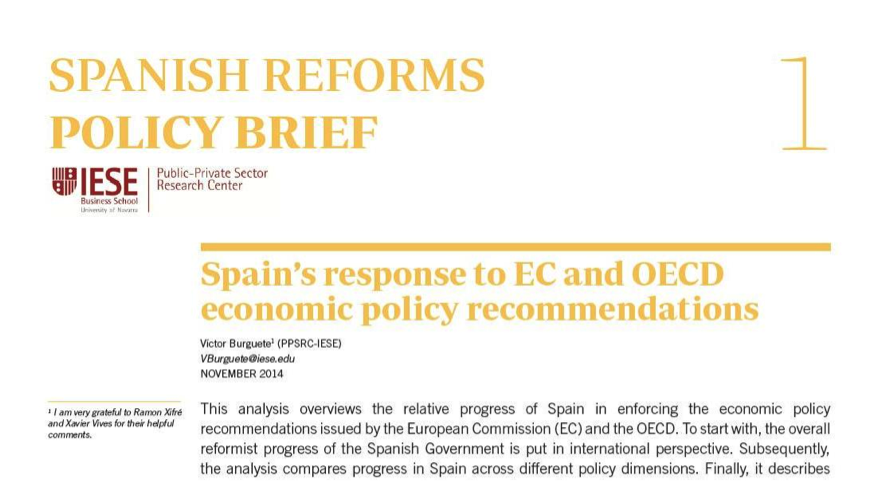 Víctor Burguete ’11 (International Trade, Finance and Development) is an Economic Researcher and Public Policy Analyst at IESE’s Public-Private Sector Research Center (IESE-PPSRC) in Barcelona. In this post, he shares the process of preparing a policy brief on Spanish policy reforms and provides an overview of the brief’s findings.
Víctor Burguete ’11 (International Trade, Finance and Development) is an Economic Researcher and Public Policy Analyst at IESE’s Public-Private Sector Research Center (IESE-PPSRC) in Barcelona. In this post, he shares the process of preparing a policy brief on Spanish policy reforms and provides an overview of the brief’s findings.
Preparing a Policy Brief like this took me over a month. It is necessary to consider than working in a research institution implies getting involved in many projects and there is usually less time than what I would like to devote to one specific project. In my opinion, it is very important to work open-minded and to continuously consider the possible connections among different projects. In the case of this Policy Brief, most of the data (international economic policy recommendations) were collected during the past few months. In late September I proposed this topic and the IESE-PPSRC research center decided to inaugurate these series of papers. After reviewing the literature (Table 1), I analyzed the data and I started creating some graphs and building the story I wanted to tell. Of course, the final text was reviewed several times until it was finally published.
“Spain’s response to EC and OECD economic policy recommendations” analyses the overall reformist progress of the Spanish Government in an international perspective. According to the international assessment, Spain ranks as one of the top reformers in the Euro Area and the EU as a whole. A second insight one gets from our Policy Brief is that Spain’s delivery, in relative terms to other countries, accelerated between 2011 and 2013.

Of course, this is the general trend and the Policy Brief offers details on the progress in the 18 policy sub-areas we cover at the SpanishReforms project, including how the reform priorities prescribed to Spain by these institutions have changed over time. Substantial progress is recognized in addressing the financial system reform, mainly in the area of recapitalization and restructuring but also by adopting other financial measures. However, both the OECD and the EC point to active labour market policies and professional services as the main structural reforms lagging behind.
More information in www.spanishreforms.com, a new an academic, non‐governmental website that aims at being a useful reference for those interested in independent, rigorous and up‐to‐date information about the Spanish economy and its economic policy reforms.
